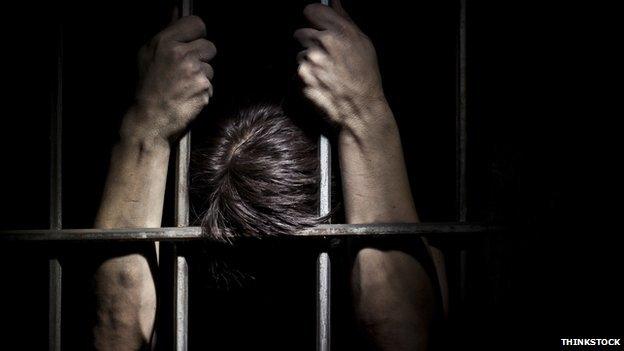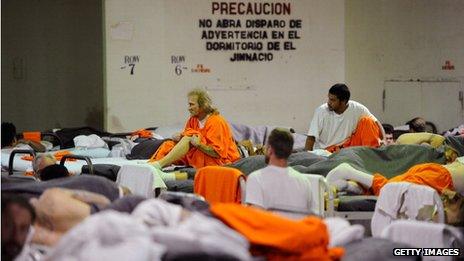Why the US locks up prisoners for life
- Published

Life sentences that truly mean a lifetime in prison are rare in the UK but common in the US. Why is this punishment so prevalent in the US?
Last week, an English court handed a whole-life sentence to Dale Cregan for murdering four people, including two policewomen.
That penalty means he will never be eligible for release, and it puts him in rare company, making him one of about 50 people in the UK serving such a sentence.
Had he been in the US, he would have been less of an anomaly.
In the US, at least 40,000 people are imprisoned without hope for parole, including 2,500 under the age of 18.
That is just a fraction of those who have been given a life sentence but yet may one day win release. The Sentencing Project, a non-profit organisation that studies sentencing and criminal justice in America, estimated in 2009 that at least 140,000 prisoners in the US now serve a life sentence.
This does not include convicts given extremely long sentences with a fixed term, like the Alabama man sentenced to 200 years for kidnapping and armed robbery.
Most of them will have the opportunity for parole - though Sentencing Project Director Marc Mauer says few will receive it.
David Wilson, professor of criminology at Birmingham City University, says several factors underlie the high number of American convicts imprisoned for life.
"In large part it reflects the overly punitive nature of the American criminal justice system," says Mauer.
"Not only do we use life sentences much more extensively than other industrial nations, but even in the lower level of event severity, the average burglar or car thief will do more time than they will in Canada or Wales."
The harsh sentences reveal a type of "sentencing inflation" that began in the 1980s and 1990s.
"It was almost a competition among legislatures of both parties to show how tough they could be on crime," says Mauer.
At the same time, the sentence is thought to send a message.
"In states like Michigan where they don't have a death penalty, this is what they have as its moral equivalent," says Franklin Zimring, professor of law at the University of California, Berkeley.
In states that do have the death penalty, long sentences underscore distaste for crimes that do not meet the threshold for capital punishment.
"This is a way of putting a denunciatory exclamation point in the punishment," he says.

Inmates in California's crowded prisons sleep in stacked beds in the gym
Politicians and other state officials are loath to be seen as soft on crime, let alone to release an offender on parole only to have him commit another crime.
The 1993 death of Polly Klaas, a young girl killed by a recently paroled man with a long criminal history, led California to pass a "three strikes" rule mandating a sentence of 25 years to life for anyone found guilty of three felonies.
But now, in both the US and the UK the sentence of life without parole is coming into question.
In England, these sentences are currently being challenged in the European Court of Human Rights, after a lawsuit brought by three men serving whole life sentences - "a double murderer, a man who wiped out his entire family to inherit money, and a serial killer," says Wilson.
These men, at least one of whom proclaims his innocence, argue that the denial of a parole option does not allow them to claim they have changed. They further argue that the assignment of these sentences is arbitrary - some convicted killers get them, others do not.
In the US, budget cuts have forced states to reconsider whether the practice of locking criminals up for long periods of time is cost-effective.
"Lawmakers in Illinois have made the decision to shut down a few prisons and let people out early in order to save money," says Dan Bernhardt, professor of economics at the University of Illinois.
"There's nothing like state budget problems to get people to see what the costs are."
In 2012, the US Supreme Court also established that for minors, a sentence of life without parole violates the Constitution's safeguards against "cruel and unusual" punishment.
The court also ruled that prison overcrowding in California - due in part to severe sentencing and the three strikes programme - violates the same safeguards. It ordered the state to release tens of thousands of prisoners.
But action after these verdicts has been slow, as state officials continue to fight in court.
In the US, once someone has been sent to prison on a life sentence, it's hard for him or her to get out.
- Published13 June 2013
- Published10 April 2012